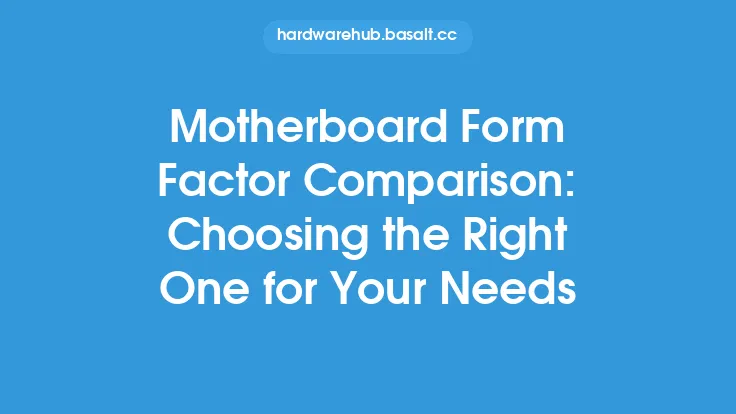When it comes to building or upgrading a computer, one of the most critical components to consider is the motherboard. The motherboard is the main circuit board of the computer, connecting all the hardware components together and allowing them to communicate with each other. With so many top motherboard brands available in the market, it can be overwhelming to choose the right one for your needs. In this article, we will delve into the world of motherboard brands, exploring their features, quality, and innovations to help you make an informed decision.
Introduction to Motherboard Brands
The motherboard market is dominated by a few top brands, each with its own strengths and weaknesses. These brands include ASUS, MSI, Gigabyte, ASRock, EVGA, Biostar, and Intel, among others. Each brand offers a range of motherboards catering to different needs, from budget-friendly options to high-end gaming and content creation motherboards. When choosing a motherboard, it's essential to consider factors such as compatibility, features, and quality to ensure that it meets your specific requirements.
Key Features to Consider
When comparing top motherboard brands, there are several key features to consider. These include the chipset, which determines the motherboard's compatibility with certain processors and features; the socket type, which affects the type of processor that can be installed; and the number of expansion slots, which determines the number of graphics cards, sound cards, and other peripherals that can be installed. Additionally, features such as USB ports, SATA ports, and HDMI ports can impact the motherboard's connectivity and versatility. Other important considerations include the motherboard's power delivery system, cooling system, and overclocking capabilities.
Chipset and Socket Type
The chipset and socket type are two of the most critical factors to consider when choosing a motherboard. The chipset determines the motherboard's compatibility with certain processors and features, such as USB ports, SATA ports, and PCIe lanes. The socket type, on the other hand, affects the type of processor that can be installed. For example, a motherboard with an LGA 1200 socket can only be used with Intel Core processors, while a motherboard with an AM4 socket can only be used with AMD Ryzen processors. Top motherboard brands offer a range of chipsets and socket types to cater to different needs, from budget-friendly options to high-end gaming and content creation motherboards.
Power Delivery System and Cooling
A motherboard's power delivery system and cooling system are critical components that can impact its performance and reliability. The power delivery system, which includes the voltage regulator module (VRM) and the power phases, determines the motherboard's ability to deliver power to the processor and other components. A high-quality power delivery system can ensure stable and efficient power delivery, while a low-quality system can lead to overheating and instability. The cooling system, which includes the heatsinks and fans, helps to dissipate heat generated by the motherboard's components. Top motherboard brands offer advanced cooling systems, such as heatpipe-based cooling and liquid cooling, to ensure optimal performance and reliability.
Overclocking Capabilities
Overclocking is the process of increasing the clock speed of the processor or other components to improve performance. Top motherboard brands offer advanced overclocking capabilities, including features such as automatic overclocking, manual overclocking, and overclocking profiles. These features allow users to push their systems to the limit, achieving higher performance and better benchmark scores. However, overclocking can also increase the risk of system instability and overheating, so it's essential to choose a motherboard with a robust power delivery system and cooling system.
Quality and Reliability
When choosing a motherboard, quality and reliability are essential considerations. A high-quality motherboard can ensure stable and efficient performance, while a low-quality motherboard can lead to system crashes, overheating, and other issues. Top motherboard brands offer high-quality components, such as solid capacitors, high-quality chokes, and advanced PCB materials, to ensure optimal performance and reliability. Additionally, features such as dust protection, humidity protection, and electrostatic discharge (ESD) protection can help to prevent damage to the motherboard and its components.
Innovations and Designs
Top motherboard brands are constantly innovating and improving their designs to meet the evolving needs of users. For example, some motherboards feature advanced Wi-Fi and Bluetooth connectivity, while others offer high-speed USB ports and SATA ports. Some motherboards also feature advanced audio and video capabilities, such as high-definition audio and 4K video output. Additionally, some motherboards offer advanced features such as RGB lighting, fan control, and overclocking software. These innovations and designs can enhance the user experience, providing a more immersive and engaging computing experience.
Conclusion
Choosing the right motherboard can be a daunting task, especially with so many top brands available in the market. By considering factors such as compatibility, features, and quality, users can make an informed decision that meets their specific needs. Whether you're a gamer, content creator, or general user, there's a motherboard out there that's right for you. By understanding the key features, chipset and socket type, power delivery system, cooling system, overclocking capabilities, quality, and innovations of top motherboard brands, users can build or upgrade a system that provides optimal performance, reliability, and value.





